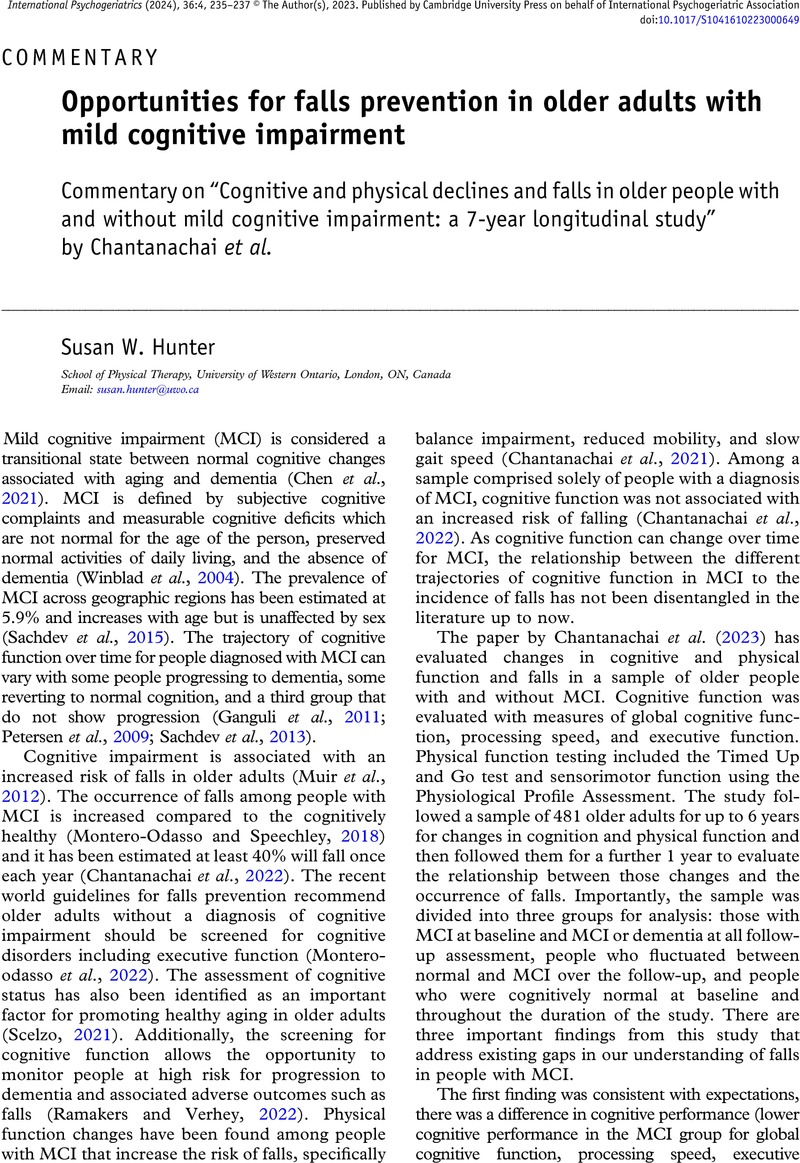No CrossRef data available.
Article contents
Opportunities for falls prevention in older adults with mild cognitive impairment
Commentary on “Cognitive and physical declines and falls in older people with and without mild cognitive impairment: a 7-year longitudinal study” by Chantanachai et al.
Published online by Cambridge University Press: 27 July 2023
Abstract
An abstract is not available for this content so a preview has been provided. Please use the Get access link above for information on how to access this content.

- Type
- Commentary
- Information
- International Psychogeriatrics , Volume 36 , Special Issue 4: Issue Theme: Behavioral and Physical Impairments in Persons with Cognitive Disorders , April 2024 , pp. 235 - 237
- Copyright
- © The Author(s), 2023. Published by Cambridge University Press on behalf of International Psychogeriatric Association
References
Chantanachai, T., et al. (2023). Cognitive and physical declines and falls in older people with and without mild cognitive impairment: a 7-year longitudinal study. International Psychogeriatrics, 1–11. https://doi.org/10.1017/S1041610223000315.CrossRefGoogle ScholarPubMed
Chantanachai, T., Sturnieks, D., Lord, S., Payne, N., Webster, L. and Taylor, M. (2021). Risk factors for falls in older people with cognitive impairment living in the community: systematic review and meta-analysis. Ageing Research Reviews, 71, 101452. https://doi.org/10.1016/j.arr.2021.101452.CrossRefGoogle ScholarPubMed
Chantanachai, T., et al. (2022). Risk factors for falls in community-dwelling older people with mild cognitive impairment: a prospective one-year study. PeerJ, 10, e13484. https://doi.org/10.7717/peerj.13484.CrossRefGoogle ScholarPubMed
Chen, Y. X., Liang, N., Li, X. L., Yang, S. H., Wang, Y. P. and Shi, N. N. (2021). Diagnosis and treatment for mild cognitive impairment: a systematic review of clinical practice guidelines and consensus statements. Frontiers in Neurology, 12, 719849. https://doi.org/10.3389/fneur.2021.719849.CrossRefGoogle ScholarPubMed
Ganguli, M., et al. (2011). Outcomes of mild cognitive impairment by definition: a population study. Archives of Neurology, 68, 761–767. https://doi.org/10.1001/archneurol.2011.101.CrossRefGoogle ScholarPubMed
Gavelin, H. M., et al. (2021). Combined physical and cognitive training for older adults with and without cognitive impairment: a systematic review and network meta-analysis of randomized controlled trials. Ageing Research Reviews, 66, 101232. https://doi.org/10.1016/j.arr.2020.101232.CrossRefGoogle ScholarPubMed
Montero-Odasso, M. and Speechley, M. (2018). Falls in cognitively impaired older adults: implications for risk assessment and prevention. Journal of the American Geriatrics Society, 66, 367–375. https://doi.org/10.1111/jgs.15219.CrossRefGoogle ScholarPubMed
Montero-odasso, M., et al. (2022). World guidelines for falls prevention and management for older adults: a global initiative. Age and Ageing, 51, 1–36.CrossRefGoogle ScholarPubMed
Muir, S., Gopaul, K. and Montero Odasso, M. M. (2012). The role of cognitive impairment in fall risk among older adults: a systematic review and meta-analysis. Age and Ageing, 41, 299–308. https://doi.org/10.1093/ageing/afs012.CrossRefGoogle ScholarPubMed
Petersen, R., et al. (2009). Mild cognitive impairment: ten years later. Archives of Neurology, 66, 1447–1454.CrossRefGoogle ScholarPubMed
Ramakers, I. H. G. B. and Verhey, F. R. J. (2022). Screening for neuropsychological assessment in the diagnostics of Neurocognitive disorder. International Psychogeriatrics, 34, 519–521. https://doi.org/10.1017/S104161022200031X.CrossRefGoogle ScholarPubMed
Sachdev, P. S., et al. (2013). Factors predicting reversion from mild cognitive impairment to normal cognitive functioning: a population-based study. PLoS ONE, 8, 1–10. https://doi.org/10.1371/journal.pone.0059649.CrossRefGoogle ScholarPubMed
Sachdev, P. S., et al. (2015). The prevalence of mild cognitive impairment in diverse geographical and ethnocultural regions: the COSMIC Collaboration. PLoS ONE, 10, 1–19. https://doi.org/10.1371/journal.pone.0142388.CrossRefGoogle ScholarPubMed
Scelzo, A. (2021). Importance of good mental health assessment to promote healthy aging. International Psychogeriatrics, 34, 507–509. https://doi.org/10.1017/S1041610221000594.CrossRefGoogle ScholarPubMed
Winblad, B., et al. (2004). Mild cognitive impairment – beyond controversies, towards a consensus: report of the International Working Group on Mild Cognitive Impairment. Journal of Internal Medicine, 256, 240–246. https://doi.org/10.1111/j.1365-2796.2004.01380.x.CrossRefGoogle Scholar




